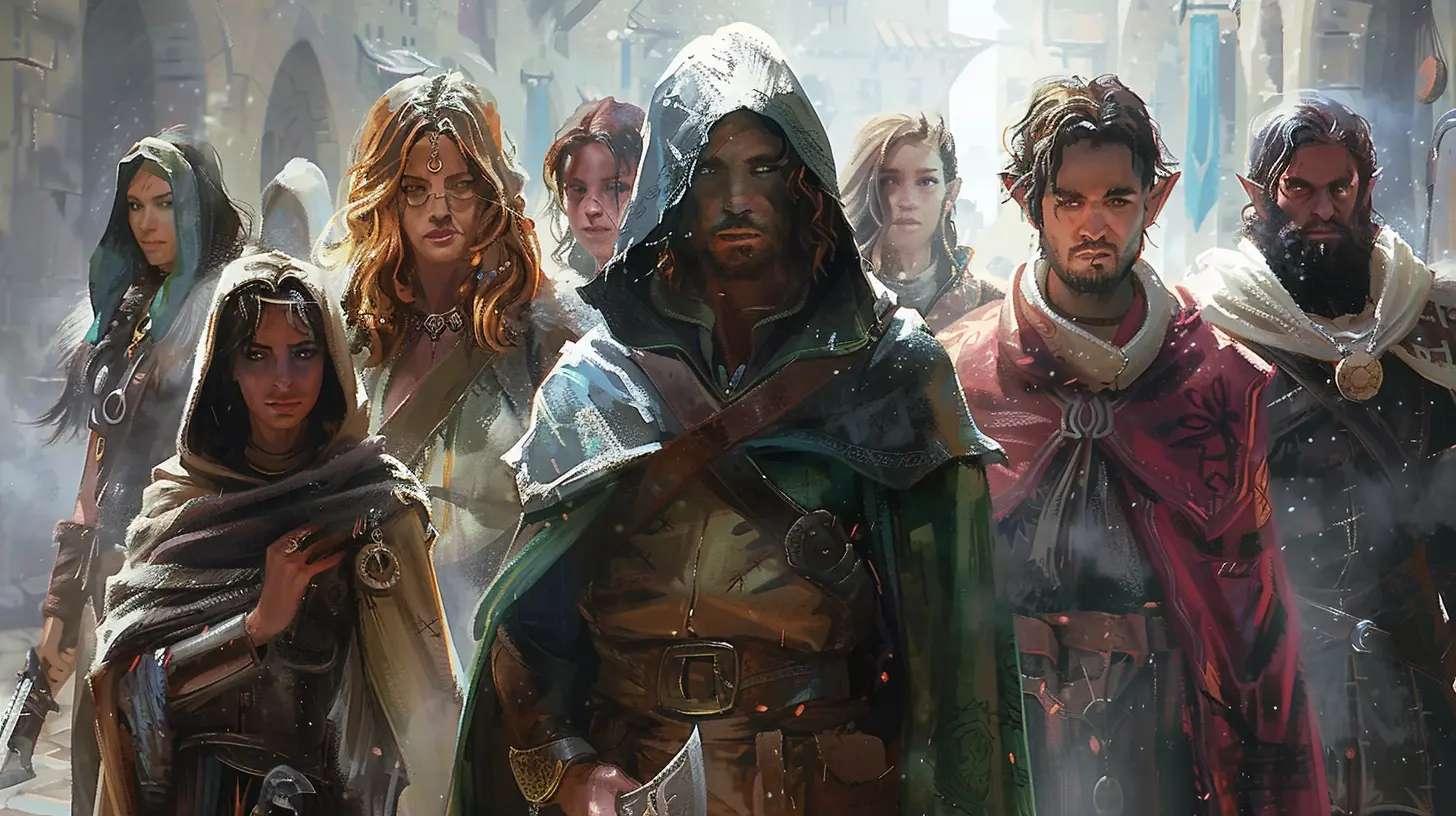How RPGs Encourage Creative Problem Solving in Players
22 July 2025
Ever found yourself bartering with a goblin warlord using a kazoo and three pinecones? No? Well, welcome to the magical world of Role-Playing Games (RPGs), where unthinkable solutions aren't just accepted—they're celebrated.
RPGs aren't just about swinging swords, collecting loot, or leveling up your elf with a cool name like “BladeSpark.” These games are playgrounds for the imagination, masterminds of mischief, and perhaps one of the best digital (and tabletop) exercises in creative problem solving.
Let’s dive into why RPGs are sneakily training your brain to think outside the box—and possibly rewire the way you approach real-life problems, too.

The Role-Playing Game (RPG) 101: What Are We Even Talking About?
Before we start decoding the magical spells of creativity, let’s make sure we’re on the same page. RPGs are games where players assume the roles of characters in a fictional setting. This can be in video games like The Witcher, Skyrim, or Mass Effect—or in tabletop ones like Dungeons & Dragons (a.k.a. the mothership of all RPGs).You get quests to complete, characters to talk to, worlds to explore, and problems to solve. And how you solve them? That’s where the magic happens. Unlike strict gameplay structures, RPGs often give you multiple—or infinite—ways to approach a situation.
It's less “follow the yellow brick road” and more “you wake up in a field… what do you do?”

Problem Solving, But Make It Epic
Let’s be real: real-world problem solving can be a slog. Taxes? Snooze. Relationship drama? Stress. Broken washing machine? Chaos.But in RPGs, problems often come in the form of dragons, ancient curses, or talking swords with attitude problems. They’re still problems—but they're way cooler. And solving them requires lateral thinking, resource management, empathy, logic, and sometimes sheer dumb luck.
Here’s how RPGs pull this off:
1. Nonlinear Quest Design = Flexible Thinking
Traditional games often hand you a clear goal and one "correct" path. But RPGs? Nah. They throw you into a sandbox and toss the instruction manual into a volcano.Let’s say you're hired to retrieve a stolen gem from a heavily-guarded fortress. In a typical game, you’d just storm in, right? In an RPG, you have options:
- Sneak through the back while the guards nap
- Disguise yourself as a traveling juggler
- Convince the guards they're late for a secret meeting
- Set the building on fire (uhh, maybe don’t)
Each of these options encourages different styles of thinking. You’re constantly weighing risk, evaluating outcomes, and stretching those imagination muscles.
2. Character Building = Empathy and Perspective
In RPGs, you become someone different. Maybe you’re a chaotic-neutral gnome bard who flirts with death—literally. Maybe you’re a noble knight with a code of honor tighter than your armor.Playing these roles makes you consider problems from different perspectives. Would your uptight paladin kill a thief for stealing bread? Would your morally grey rogue see it as a business opportunity?
This perspective shifting is huge in real-world problem solving. It teaches empathy, understanding opposing viewpoints, and thinking beyond your default reactions.
3. Consequences Matter — And That’s Where It Gets Juicy
In many RPGs, your choices stick. You can't just replay a conversation like it's a YouTube video.Say the mayor asked for your help clearing out some bandits. You agree, and on a whim, you insult his hat. Now he hates you. Goodbye quest, hello awkward town meetings.
This teaches players to think ahead. If every action potentially flips the game world on its head, you start approaching situations more thoughtfully. Not in a boring way—but in a “how can I pull this off and still get paid” kind of way.
4. Resource Scarcity = Tactical Creativity
RPGs love to strangle you with limited resources. What's that? You're out of healing potions mid-battle? Welp, time to hide behind a rock and hope your companion, a talking squirrel named Marvin, can revive you.These situations force players to get scrappy. Whether it’s a shortage of supplies, allies, or information, you’re constantly adapting. You start asking questions like:
- Can I bribe this enemy?
- What if I lure them into a trap?
- Will Marvin betray me for peanuts?
You start seeing possibilities where others see dead ends.
5. Puzzle Elements = Brain Gymnastics
Ever had to open an ancient tomb using only three runes, two chicken bones, and a poem written backwards in Elvish? That’s an average Tuesday in RPG land.RPGs love to sprinkle puzzles throughout the world. These aren’t just about intelligence—they're about creative interpretation.
You start to recognize patterns, think symbolically, and test weird theories. It’s like being Sherlock Holmes, but with more capes and possibly werewolves.
But Wait, It’s Not Just Digital
Let’s sail from pixel land into the cardboard kingdom of tabletop RPGs, because the creativity dial goes up to eleven here.In games like Dungeons & Dragons, there’s no animation budget or programming limits. If you can imagine it—and your Dungeon Master doesn’t explode from confusion—you can do it.
Players have opened treasure chests using summoned raccoons. They’ve stopped wars by baking magical pies. They’ve solved riddles by... accidentally sitting on them.
That blank-slate creativity means the solutions are as weird—or as brilliant—as the players allow. It’s improv comedy, theater, and chess rolled into one.

Real-World Benefits: No Dragons Required
You might be thinking, “Ok, sure, that’s cute, but when will I ever need to trick a skeleton into giving me a key in real life?”Fair. But here’s what RPG-style problem solving can help with:
✔️ Critical Thinking
You get used to analyzing situations from multiple angles. Suddenly, that team project or job interview doesn’t seem so hard.✔️ Risk Assessment
RPGs constantly throw risk and reward at you. That muscle memory makes you more comfortable with uncertainty in real life.✔️ Teamwork and Communication
In multiplayer or tabletop RPGs, collaboration is king. You’ll learn how to negotiate with stubborn party members, plan as a team, and apologize profusely when you accidentally set the tavern on fire.✔️ Resilience and Adaptability
Failure in RPGs is frequent. But it’s rarely fatal. That loop of “try, fail, adjust, repeat” helps players build confidence and flexibility.The Side Quests of Creativity
The side effects of this creative problem solving? They bleed into other areas:- Writing better stories and essays
- Thinking faster on your feet
- Designing more engaging projects or presentations
- Even parenting (trust me, nothing prepares you for a toddler like a Dungeon Master with a grudge)
And let’s not forget: it’s fun. RPGs turn thinking into a game. A ridiculous, fantastic, fireball-flinging game.
Quick Real Examples To Blow Your Mind
Still skeptical? Cool. Let me rapid-fire a few ways real players solved RPG problems:- A bard beat a demon in a dance-off to avoid combat.
- A wizard tricked an army by casting illusions of reinforcements.
- A rogue got out of jail by pretending the king was allergic to iron and “saving” him by stealing his crown.
Would these solutions work in real life? Nope. But that’s not the point. The ability to dream them up? That’s the gold.
Final Thoughts: RPGs Are Brain Gyms Wrapped in Fireballs
If creativity is a muscle, RPGs are a full-body workout… except with more dragons and snack breaks.In a world that often rewards straight lines and predictable paths, RPGs let you scribble outside the lines. Solve quests with flair. Trick trolls with riddles. Talk your way out of disasters using charm, dice, and sheer nerve.
So next time you’re trying to fix a broken printer, don’t just reboot it.
Ask yourself: What would my level 7 sorcerer do?
Probably summon a gremlin. But hey—it’s worth a shot.
all images in this post were generated using AI tools
Category:
Role Playing GamesAuthor:

Stephanie Abbott
Discussion
rate this article
2 comments
Norah McKay
RPGs ignite imagination, proving that true creativity flourishes through challenges and immersive storytelling.
November 19, 2025 at 5:38 PM

Stephanie Abbott
Thank you! RPGs truly transform challenges into opportunities for creativity, making storytelling a powerful tool for problem-solving.
Renee Hahn
RPGs: where slaying dragons and befriending giant squirrels are both valid strategies for world domination!
August 4, 2025 at 3:36 AM

Stephanie Abbott
Absolutely! RPGs foster creativity by allowing players to explore unconventional strategies, whether it’s through epic battles or quirky alliances, showcasing the limitless possibilities of problem-solving.


